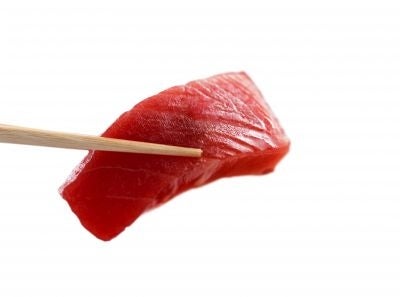In May, Japan continues to crack down on tourists attending Tokyo's renowned tuna auctions, however the problem might resolve itself once tourists and sushi lovers around the world learn that sushi-grade tuna has more mercury than canned tuna.
Researchers at the American Natural History Museum's (ANHM) Sackler Institute for Comparative Genomics and Rutgers University have found restaurant sushi-grade tuna has more mercury than canned tuna by using fish DNA barcoding published in the April 21 early online edition of the journal Biology Letters.
In an ANHM announcement, Jacob Lowenstein, a researcher in the study said, "we found that mercury levels are linked to specific species. So far, the U.S. does not require restaurants and merchants to clarify what species they are selling or trading, but species names and clearer labeling would allow consumers to exercise greater control over the level of mercury they imbibe."
The study analyzed mercury content in 100 tuna sushi samples (bigeye tuna, yellowfin tuna and bluefin tuna species) from 54 restaurants and 15 supermarkets in New York, New Jersey, and Colorado during 2007-9.
Joanna Burger, professor at Rutgers University, explained, "although levels are highest in top-level predatory fish, some fish that are lower on the food chain have high levels. The levels of mercury in some tuna are sufficiently high to provide a health risk both to the fish themselves and to the predators that eat them, including humans, particularly those who eat fish frequently."
The problem is that "you can't consistently count on getting tuna that is on the lower end of the spectrum in terms of its mercury level."
Sergios-Orestis Kolokotronis, a geneticist at the Sackler Institute for Comparative Genomics at the Museum said, "this is one of first applications of DNA barcodes in a non-academic setting - using this method in any human health context and not just for determining whether barcodes can quickly and accurately identify a species."
If you are a tuna lover, Burger recommends incorporating these healthier habits, according to LiveScience, a science news site:
- Adults should never eat more than seven or eight pieces of tuna sushi per month.
- Eat light tuna instead of white tuna, or albacore to limit mercury exposure as mercury levels can be up to three times higher in albacore than light tuna.
- Women who are considering becoming pregnant should not eat tuna sushi.
- Some fish (salmon) are generally lower in mercury, and are safer to consume in larger quantities.
Full study, "DNA barcodes reveal species-specific mercury levels in tuna sushi that pose a health risk to consumers:" http://rsbl.royalsocietypublishing.org/content/early/2010/04/13/rsbl.2010.0156.full
Subscribe to Independent Premium to bookmark this article
Want to bookmark your favourite articles and stories to read or reference later? Start your Independent Premium subscription today.


Join our commenting forum
Join thought-provoking conversations, follow other Independent readers and see their replies